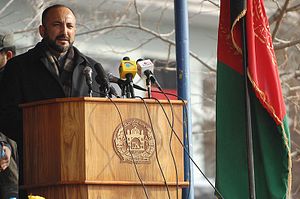Todya, former Afghan National Security Adviser Mohammad Hanif Atmar announced his candidacy for next year’s presidential elections. Atmar has been a central figure in Afghanistan for years. He signed the 2014 Bilateral Security Agreement (BSA) with the United States and inked a 2016 peace deal with Hizb-i-Islami (Islamic Party), an extremist insurgent faction that had been fighting with Afghan and later U.S. forces for decades. The Hizbi-i-Islami accord was the first successful peace deal between the Afghan government and insurgents.
Atmar resigned from his NSA position three months ago, citing concerns over the security situation, political instability, and differences with President Ashraf Ghani on major policy issues. Western diplomats stationed in Kabul and Afghan citizens were concerned about Atmar’s resignation, fearing that his absence would cast a shadow over the country’s fragile National Unity Government at a time when it was already reeling from Taliban attacks and emerging presence of Islamic State Khorasan Province (ISKP). Moreover, Atmar’s presence was sorely needed for brokering a peace deal with the Taliban.
After the successful breakthrough with Hizb-e-Islami, Atmar is eager to conclude a peace deal with the Taliban, and firmly believes that goal is possible. During his visit to Washington D.C. last March, he said that the government “should negotiate with anyone who is reconcilable,” including the Haqqani Network.
Since 2001, in the post-Taliban era, Atmar has been at the center of Afghan politics and major decision making. He has been successful in consolidating political power since his return to Afghanistan from Britain following the U.S.-led invasion of Afghanistan. Since then, Atmar has served in key positions as minister of rural development and rehabilitation in Hamid Karzai’s transitional government from 2002-2006, education minister from 2006-2008. and interior minister from 2008-2010. As national security adviser in the current administration from 2014-2018, Atmar was widely considered the most competent strategist, a leader with a vision.
Atmar was involved in almost every major decision by the government: dealing with powerful warlords, ethnic politics, foreign policy, brokering political deals, and negotiations with the Taliban. Due to his effectiveness in influencing regional and international politics and excellent services, Ghani conferred upon him the highest state medal in 2016. Atmar played a pivotal role in restoring NATO’s trust in Afghanistan, after which NATO pledged its support to Afghanistan in the long run.
Atmar role in fight against the ISKP has been of particular importance. Through his shrewd strategy he was able to thwart the group in Afghanistan’s eastern province of Nangarhar. Moreover, he was able to keep the fight under Afghan government control and out of the hands of the regional strongmen inclined to armed militias. Neighboring countries were tacitly helping the local warlords and strongmen create their own armed militias under the pretext of fight against the ISKP. Militias have historically posed a threat to rule of law in Afghanistan as well as being behind human rights violations. But Atmar kept the fight against the ISKP and anti-terrorism efforts under the Afghan security forces’ supervision and command, helped by the U.S. troops present in Afghanistan.
Amid intensified peace talks with Taliban and political bickering among the leaders of the National Unity Government, political alliances have been making and breaking. Since Atmar’s resignation from his position as NSA, political horse-trading and coalition-building has sped up. There has been tacit conversation among opposition leaders and some key people in the government, who are all jockeying for political mileage and share in the next government — and Atmar remains the focal point. There are reports that Jamiat-e-Islami (JI) and the Northern Alliance, which used to blame Atmar for centralizing power, has come to back him in his bid for the next presidential elections. Western-educated technocrats and most of the current cabinet ministers are reportedly backing him too. While political deals and maneuverings are on the rise behind closed doors, the political opposition is becoming more vocal in its criticism of the current government.
Next year’s presidential election remains a serious matter not only for Afghanistan but for the international community, particularly the United States. At a critical time when the United States is in direct conversation with Taliban insurgents, the election is of critical importance to avoid political deadlock and crisis such as followed the previous presidential election in 2014. Back then, after a long tussle between Ghani and runner-up Abdullah Abdullah, then-U.S. Secretary of State John Kerry brokered a deal by introducing the new position of chief executive officer for Abdullah. The position – and thus the deal — was unconstitutional and sparked criticism from the public.
Though security remains a priority and continues to dominate the news on Afghanistan,, there is even more at stake. The country’s fragile internal political and ethnic imbalance could become worse if not controlled through a rational approach. One of the major upcoming challenges for Afghan politicians and the international community, especially the United States, will be how to handle the expected political deadlock and respond to strongmen who often want to take their share in the government by force. This could be done through backing a national leader who has public support and can bring all ethnic groups together under one umbrella through consensus.
Ahmad Shah Katawazai is the member of the Academy of Sciences of Afghanistan and former defense liaison at the Afghan Embassy Washington D.C. Katawazai has a master’s degree in Global Security Studies from Johns Hopkins University and a master’s in International Legal Studies from American University. Katawazai is a published writer. You can follow him on Twitter: @askatawazai

































